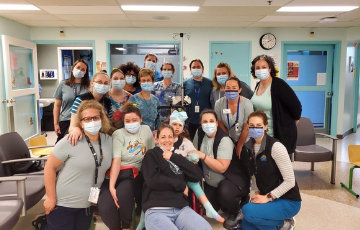The STOP HIV/AIDS Program is honoured to announce the 2024 recipients of its community grants. Eligible initiatives are awarded one-time grants of up to $10,000 to plan and deliver activities addressing HIV prevention, testing and engagement into care and treatment.
HIV (Human Immunodeficiency Virus) is a virus that weakens your immune system.
There is currently no cure for HIV, but medication can reduce the amount of virus in the body and help you to stay healthy. Without treatment, your immune system can become too weak to fight off serious illnesses and you can become sick with life-threatening infections. This is the most serious stage of HIV infection, called AIDS (Acquired Immunodeficiency Syndrome).
- How can I prevent the spread of HIV?
-
You can get HIV through activities where you come into contact with infected blood, semen, vaginal or anal fluids or breast milk.
The most common ways for this to happen is through unprotected vaginal, anal, or oral sex with someone who is HIV positive or sharing needles, syringes or other drug use supplies with someone who is HIV positive.
Practicing safer sex or safer drug use can help decrease your risk of getting HIV.
- How can I practice safer sex?
-
Practicing safer sex means:
using a latex or polyurethane condom whenever you are having vaginal, anal, or oral sex using a new condom every time (e.g., do not reuse condoms) getting tested with all new partners before you have vaginal, anal or oral sex
- How can I practice safer drug use?
-
Practicing safer drug use means: not sharing needles, syringes, crack pipes or other drug use supplies.
You can pick up safer sex supplies (such as male and female condoms and lube), as well as safer drug use supplies (such as clean needles, syringes and other drug use supplies) at a harm reduction site in your area.
- How can I get tested for HIV?
-
The provincial HIV testing guidelines recommend all adults in B.C. get tested for HIV. There are a number of different ways you can get tested for HIV.
Most often, a HIV tests requires blood to be drawn and sent to a lab for testing (called serologic testing). The tests look for the presence of HIV antibodies (your body’s defense reaction to the HIV virus) in your blood. It can take from one to two weeks to receive the result from your HIV test.
You have the option to request a nominal or non-nominal HIV test. A nominal HIV test means that if your test comes back positive, your full name will be reported to the Medical Health Officer (in B.C., HIV is a reportable disease and all positive test results must be reported to the Medical Health Officer). A non-nominal HIV test means that if your test comes back positive, only your first name, initials and date of birth will be reported to the Medical Health Officer.
Testing using an alias (a made up name) or only your initials is available at certain testing sites in B.C.
- How can I find an HIV testing clinic near me?
-
There are a number of HIV testing clinics where you can have an HIV test either by appointment or by drop-in. Check the SmartSexResource clinic finder to find the location of a clinic near you.
- Talk to your health care provider
-
The BC HIV Testing Guidelines recommend that health care providers know the HIV status of all patients under their care. This means that an HIV test should be offered:
- routinely, every five years, to all patients aged 18-70 years
- routinely, every year, to all patients aged 18-70 years who belong to populations with a higher burden of HIV infection
- once at age 70 or older if the patient’s HIV status is not known
- What is rapid HIV testing?
-
A rapid HIV test, also known as a Point of Care (POC) HIV test, is an HIV screening test that can be performed on-site while a client waits. The tester will poke the client’s finger and collect a small sample of blood which is screened for the presence of HIV antibodies.
Those who screen non-negative must have a blood draw to confirm the result; however, those who screen negative will have their results within minutes. To find a clinic offering POC HIV testing near you, visit the SmartSexResource clinic finder and from the “Offering this Service” drop-down menu, select “HIV Testing (Point of Care)."
If you are worried about a possible exposure to HIV within the last three (3) months, a POC HIV test is not the best option as it cannot detect HIV in the earliest stages of infection.
Talk to your health care provider about serologic testing instead. It is important to get tested as soon as possible following a possible exposure to HIV as it is easiest to spread to others in the earliest stages of infection.
- What is anonymous HIV testing?
-
Anonymous HIV testing is currently available at the Victoria Health Unit STI Clinic as part of a pilot project run by the BC Centre for Disease Control (BCCDC).
Anonymous HIV testing links a person to their test result using a numbered code that only they know. No identifiable or contact information is collected and the person being tested must provide their code in order to receive their result.
- What happens if my HIV test is positive?
-
A positive result on a HIV test means you have HIV. You may experience shock or denial about the diagnosis. However, with appropriate treatment, HIV is now considered a chronic disease – it is no longer a death sentence.
There are a few important steps you can take following your diagnosis:
- try to find a doctor or nurse practitioner who has experience treating HIV
- eat properly, exercise, get enough rest, quit smoking and limit how much alcohol you drink
- you may want to talk to someone about your HIV diagnosis - if you are in distress, you can call the 24-hour Vancouver Island Crisis Line at 1-888-494-3888.
- talk to a health care provider about ways to prevent spreading HIV to others, especially if you were diagnosed soon after infection
- practice safe sex - the amount of virus in your body is very high during the early stages of infection so practicing safer sex is even more important during this time
- let any recent sexual partners know that they should consider getting tested for HIV - if needed, a Communicable Disease Nurse or other health care provider can help deliver this news
- What disease category is HIV?
-
With appropriate treatment, HIV is now considered a chronic disease.
HIV treatment not only extends life expectancy, but also stops the progression of HIV to AIDS and helps prevent the spread of HIV in the community.
- Why is HIV treatment important?
-
Without treatment, your immune system can become too weak to fight off serious illnesses and you can become sick with life-threatening infections.
Some benefits of successful treatment include:
- keeping the virus at low levels to protect your body from the ongoing effects of infection and immune system activation - this also helps prevent the further spread of HIV in the community
- strengthening your immune system so you can better fight off infections
- slowing down disease progression
- Once you start treatment
-
Once you start treatment, it is very important that you take your medications every day as prescribed in order for the treatment to work. This is known as adherence. There are resources available to help you remain adherent to your medication. Talk to your health care provider for more information.
CATIE’s Guide for People Living with HIV provides more information about treatment, as well as the pros and cons of HIV treatment.
If you need help finding a health care provider, the Positive Living Society of BC provides a registry of health care providers and services who provide care and treatment to individuals living with HIV. You can also contact the Island Health Communicable Disease Program in your area for assistance.
- What are my HIV treatment options?
-
There are many drugs, strategies and combinations of HIV drugs available (HIV drugs are known as highly active antiretroviral therapy [HAART]).
Some options are more common than others; however, it is important to work with your health care provider to determine what options will work best for you.
- How much does HIV treatment cost?
-
HIV treatment for HIV positive clients living in B.C. is paid for by the province.
- What is the STOP HIV/AIDS program?
-
Island Health launched the STOP HIV/AIDS Program in April 2013 using special funding received from the B.C. Ministry of Health to develop new and expand current HIV programs and services. STOP stands for 'Seek and Treat for Optimal Prevention.'
The STOP HIV/AIDS Program is focused on three priority areas for action:
Prevention and harm reduction, HIV testing & engaging and retaining people in treatment and care
Through our work in these three areas, Island Health aims to reduce the spread of HIV through improved prevention services, to diagnose individuals as early as possible after they have been infected through broad-based and targeted testing, and to provide improved treatment and care services to help those who are HIV positive live long and healthy lives.




